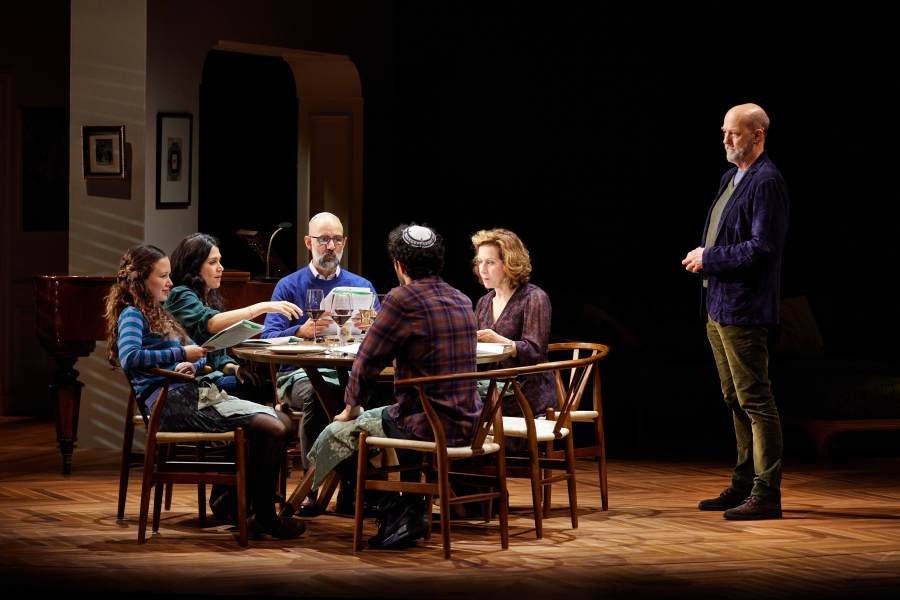

Towards the end of “A Prayer for The French Republic,” the latest play by Josh Harmon, Grandpa Pierre (played by Richard Masur) asks his family “Why do they hate us?” Then follows a lengthy series of one-liners as each of the family enumerates reasons why the Jews have been hated and persecuted for years. Sadly, many of us in the audience of the Samuel Friedman Theater had heard them all before.
After several weeks of postponements, I finally got to attend the play. The story, which takes its title from a prayer recited in French synagogues since the late 1800s, is a sprawling family drama that spans five generations of a Jewish-French family. It traces the Salomon family who has been selling the pianos that bear their name. (As a reminder, a piano is on stage the entire time.) The story begins in the 20th century with Marcelle (Betsy Aidem) explaining the family’s lineage and their relationship to Molly (Molly Ranson,) a distant cousin who is visiting from America.
Molly is a bit of a sounding board. She is a “Jew of extraction” and explains that she knows nothing about Judaism or the family history. Many of the traditions and historyhave to be explained to Molly (and by extension, those in the audience who may not be familiar with it.)
Having survived the Holocaust, Pierre, Marcelle’s father, married a non-Jew and brought up his children with no religion. However, when his daughter Marcelle marries Charles Benhamou (Nael Nacer) an observant Jew, the family began to follow traditions. Their son David (Aria Shahghasemi) teaches in a Jewish day school and wears a kippah. When he is attacked for being Jewish at the very onset of the action, the play begins its lengthy discussion about anti-semitism.
The show moves back and forth between France 2016-2017 and France 1944-1946. Marcelle’s brother, Patrick Salomon, (Anthony Edwards ) serves as a narrator of the past but participates as a character in the present. He explains that he doesn’t really know what went on between Irma (Nancy Robinette) and Adolphe (Ari Brand,) his and Marcelle’s great- grandparents, their grandfather Lucien and Pierre as a young boy (and Holocaust survivor.) Lucien survives the concentration camp and returns with his son Pierre who will grow up to be Marcelle and Patrick’s father.)
Led by award-winning director David Cromer, the play takes its name from the prayer included in the synagogues. Like Tom Stoppard’s intense play “Leopoldstadt,”about a Jewish family who considered themselves German first and Jews second, these characters are initially connected to their country more than their religion. Then anti-semitism comes very close. After walking his son to synagogue, Charles announces he’s afraid and wants to go to Israel where they don’t have to worry about being Jewish.
The play becomes a dark history lesson about the persecution of the Jews. In a surprisingly funny yet sobering and informative conversation, David’s sister Elodie, (Francis Benhamou) details some of the many horrific events that befell the Jews over the years. Between Elodie and Patrick, the audience learns of several awful incidents in Jewish history, including Peter the Hermit and a massacre of the Jews during the Crusades.
As Marcelle, the matriarch and a psychiatrist, Adiem is excellent, reprising her role as she is torn between her country and her religion. Unexpectedly humor comes from from Elodie (Francis Benhamou) who does a wonderful job. Obviously smart, she rarely stops to take a breath. There's also comedy in the familiar mother-daughter relationship, which many of us will recognize.
Manhattan Theatre Club moved the play to Broadway after its successful Off- Broadway premiere where it won Drama Desk and Outer Critics Circle Awards. Several in the cast are reprising their original roles. Others, like Edwards, are new to the drama.
Harmon’s script is well-written but could have been pared down. At times it felt like we were being hit over the head with the theme. In fact, it felt like I was taking a class in history of Jewish persecution.
Given recent events around the world after the October 7 attack in Israel which led to the slaughter of 1200 Israelis and the abduction of over 200 hostages, the play seemed especially prescient. The play strongly reinforces the virulence of anti-semitism throughout history and would be timely at almost any time. It’s the major theme in “A Prayer for the French Republic.”
Charles notes, “The only reason we're still on this planet is because we learned to get out of dangerous situations before they got the better of us. Something is happening in the world, and it's happening in our country, too--” He’s speaking about France, but sadly, could be talking about any country today.
.
Samuel J. Friedman Theatre
261 West 47th Street
(between Broadway & 8th Ave.)